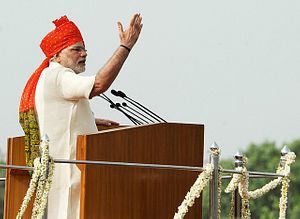With two days left until the implementation of the Goods and Services Tax bill (GST) different stakeholders within the Indian economy are gearing themselves up for a severe shock to everyday economic routine. Aimed at simplifying and streamlining the taxation regime in India, the GST has been touted as a move towards a common market. The move is being afforded high significance by international investors. An important purpose of the GST is to avoid a cascade of taxes, however as a value-added tax, the mechanism places the final burden of taxation upon the consumer despite a potentially lower overall taxation rate. The upheaval that the GST brings to the taxation regime has made it an important source of concern for the domestic market.
First, the Indian federal system allows taxation regimes to differ across states and be guided by state governments hitherto. The GST is an attempt at compromise by both the center and the states, and as early critics have pointed out, this has led to a series of exemptions and cesses rather than the expected smooth system. However, at least politically, the support of former Prime Minister Manmohan Singh has been useful in preventing a deadlock. With Singh’s support, the Congress made no moves to break political consensus, allowing the Modi regime to prepare for the launch.
Second, in terms of litigation, trends indicate that the legal system that is already clogged with indirect tax appeals ahead of the GST roll out is likely to get combative. Lawyers in India have already indicated their expectation of a litigation wave, and have begun to prepare. The threat of extensive litigation is supplemented by predictions that the GST is a windfall for corporations. The finance minister of Kerala, Thomas Isaac, indicated in his recent public statement that the GST was heading towards a “corporate bonanza” and felt that the government had not put in the sufficient infrastructure for a new tax regime.
The GST’s four-slab structure is confusing retailers too, who have called the tax regime unclear. The Confederation of All India Traders (CAIT) has initiated a call for the government to sit with traders and iron out difficulties. E-commerce merchants have already asked for and been granted a deferral of GST implementation to help them prepare for the overhaul. Chains of small suppliers and Small and Medium Enterprises (SMEs) were also expecting a deferral and have been caught ill-prepared ahead of the roll out. Banks have similarly deferred new bullion imports ahead of the GST in order to gain more clarity about how the system will work in practice.
Telecom, meanwhile, has made a move towards absorbing its tax rate for prepaid consumers. The consumer industry in the meanwhile has been struggling with placing brand margins – with several trying to clear stock ahead of July 1 and some planning significant price hikes later in the month. The automobile industry on the other hand is expecting a boost through the narrowing of margins between different car brackets by virtue of the new tax regime.
The media and taxation pundits have attempting to break down the complexity of the GST for the public – in terms of comparisons with conventional systems, a lay out of new burdens, the return filing process, etc. This influx of information is equally unsettling and reassuring people, with even vocal proponents of the GST predicting teething issues and early hiccups in potential implementation. Some shops have engaged in strikes and protests, while others have authorized precautionary shutdowns on the day of the roll out.
In this context, the call for an ombudsman to address and redress traders’ concerns has been especially loud. The last two days before implementation have been particularly critical for the Modi government. The Congress Party has announced that it will not be attending the midnight launch, even though it does not oppose the GST, while other parties have criticized the regime for not taking more time with implementation. A so-called war room to address implementation queries has been setup by the Central Board of Excise and Customs. This GST Feedback and Action room will attempt to tackle implementation glitches real time as the roll out unfolds.
All eyes are on the government in the face of mounting critique, confusion and skepticism as the Modi regime attempts an overhaul that over a decade of governments have failed to push through. If properly implemented it could cement approval ratings that have dropped since the demonetization debacle last fall. If improperly implemented, it could prove to be a fatal source of dissatisfaction for the Modi administration.

































